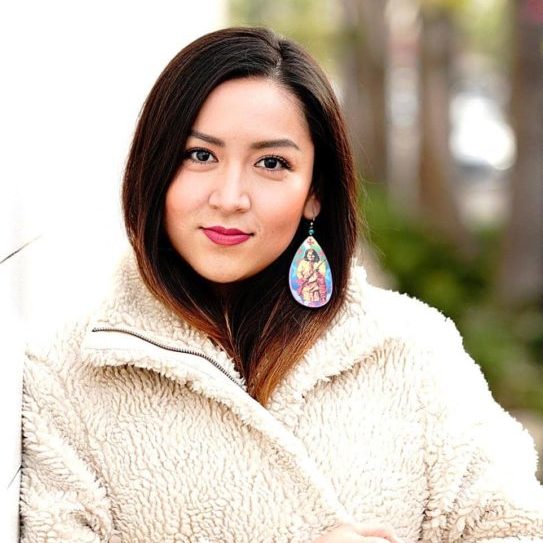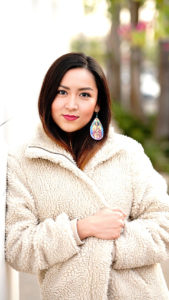Allie Young is Diné from the Navajo Nation. She is the founder of Protect The Sacred, a program at Harness. Protect The Sacred was founded in March 2020 as a response to how hard the Navajo Nation was hit by the COVID-19 pandemic. Officially launched with a Facebook live, which was joined by Allie’s friend, Mark Ruffalo, they set out to get proper messaging out to members of the Navajo Nation about staying home, staying safe, and informing what COVID-19 is. They were later joined on another Facebook Live by Paul Rudd and Taika Waititi to speak with leaders from Navajo Nation and to call on the youth to be the “modern day Monster Slayers.”
Today, Protect The Sacred roots their messaging in Navajo culture and creation stories. They work on rapid response and messaging, creating PSAs to get medical volunteers to come out to the Navajo Nation to help in getting PPE and essential supplies. Protect The Sacred also does Get Out The Vote work, including their Ride To The Polls campaign; as well a Census outreach — which Allie said “Let’s show up, be counted and make our voices heard. Let’s elect leaders that will sincerely bring us to the table.”
HeadCount: What inspired you to start your community work?
Allie: It’s about the ancestors that I come from, and about my grandparents, great-grandparents, and great-great-grandparents, who instilled these values in me. The values are around community and being Native, and the importance of our culture and protecting that. That is what is sacred to our people.
A lot of my work also revolves around Native youth and Native youth leadership development. The youth are our bridge from our ancestors and the knowledge that’s passed down for generations. We are always thinking about our youth because they’re the ones who inherit that knowledge and continue to pass it down. As Indigenous people, we are always thinking about “The Seven Generations To Come”, which means that whatever decision we are making right now, whatever action we are taking, we’re not just thinking about how it will benefit us right now in the moment, but we’re also thinking about how our actions now are going to impact the next Seven Generations.
You returned to Dinétah (Navajo land) from LA in March 2020. What surprised you most when you returned?
Allie: The presence of COVID. I returned home because everyone was quarantining and at that time, I was living alone. I wanted to be with my family, and since everyone was working remotely, this was an opportunity to be with my family. Part of my thinking was if there’s any safe place to be, it’s reservations, thinking that we will keep COVID out. But as we know, COVID doesn’t acknowledge borders, so it ended up entering Navajo Nation. I was surprised by that, and then the fact that we became the hardest hit community in the country.
You’ve talked about being caught up in the assimilation process — how has that affected your relationship with your culture and language today?
Allie: I feel connected to both cultures at the same time, but as a whole, the assimilation process has had an impact on all of our nations. It’s something that has caused us to work on language restoration and cultural lateralization. Thankfully, there’s this sort of cultural renaissance happening across Indian country with Native youth, who are, in a lot of ways, more connected to the culture than ever before. This interest and desire to reconnect is beautiful to see. It’s nice to see many people who didn’t grow up on reservations coming back and wanting to learn about their tribes, culture, and community and help in any way that they can.
One of your passions is working with Native youth. At HeadCount, we like to say that The Future Is Voting. How would you say that Native youth can be better civically engaged?
Allie: By organizing within their communities and ensuring that our elders and our young voters are participating in voting. It’s important that they’re informed and that they’re getting the word out in the community. It’s important that they show up and vote, and I think we are realizing our power, especially after the 2020 election where we had a huge contribution and impact. Our Native youth have realized their power and my message to them is “let’s build on that momentum and let’s keep showing up.”
How can organizations like HeadCount reach Native youth better?
Allie: Find where the community is. Join in and partner with Native organizations to create events or gatherings where we can distribute information. It’s also important to go into the communities — when you show up, the community has a different level of respect and it shows that your organization wants to hear Native voices.
Native Americans can face unique challenges to vote including: historical voter suppression, lack of residential street addresses, limited access to transportation in remote areas, etc. Can you talk a little bit about your own/your family’s experience with voting?
Allie: This past election, the reason we did our Ride To The Polls campaign was to convey how difficult it was for our ancestors to vote — and show the barriers that still exist in the tribal community around getting to the polls. The distance we have to travel to vote is a big issue, and there’s also Voter ID problems, where some states don’t accept P.O. Box addresses. Personally, my Arizona ID has our P.O. Box because we don’t have street names in rural parts of the reservation. In the 2018 midterm elections, I was in Montana helping some people fix their IDs. In my experience leading Ride To The Polls, it was eye opening how limited access there is to polling places and ballot drop boxes. I didn’t see nearly enough drop boxes, and they weren’t in every community, which didn’t make sense to me. Something I really want to work on going into the 2022 midterm elections is tapping into the system and infrastructure that already exists within the Navajo Nation. Something a lot of people don’t realize is that we have our own Tribal government, where we elect our own leaders within the Nation. And that system works really well for the Navajo Nation and our Diné people really do show up in those Tribal elections to vote for our leaders. If we can just tap into that system that already exists, I think we would have just as much of a turnout for state and federal elections.
What have you been listening to lately? Do you have any Native artist recommendations?
Allie: Oh wow, yeah! We have so many amazing Native artists! My good friend Raye Zaragoza is a great Folk singer. Mato Wayuhi, he’s actually the soundtrack producer for Reservation Dogs, which is a new show on Hulu about Native communities. Specifically to Navajo Nation, there’s this awesome country artist and he goes by Dirt Rhodes. The Levi Platero Band is great too. Supaman, who is from the Apsáalooke Nation and he’s a hip hop artist. Frank Waln is a hip hop artist from the Rosebud Sioux Nation. And of course, the one that is really popular is, The Halluci Nation, they used to go by A Tribe Called Red.
Get involved and follow Protect The Sacred on Facebook, Instagram, Twitter, and on their website.
HeadCount uses the power of music and culture to engage with young people and Protect The Sacred is similarly engaging young people around Indigenous culture. The power of culture is translated into action.

